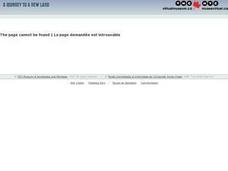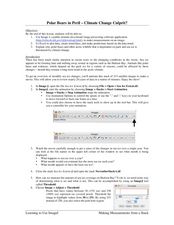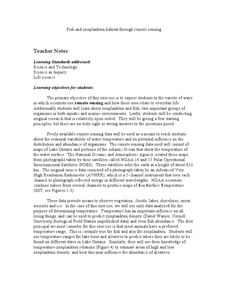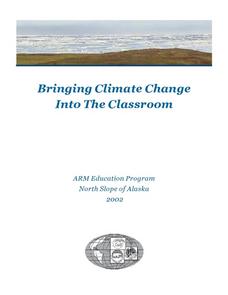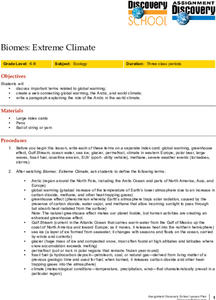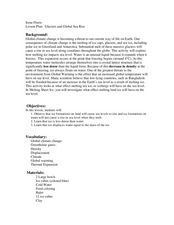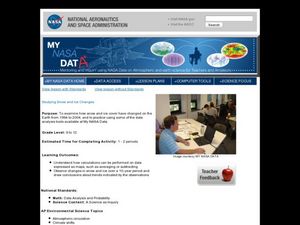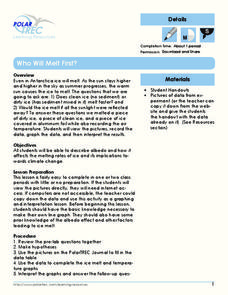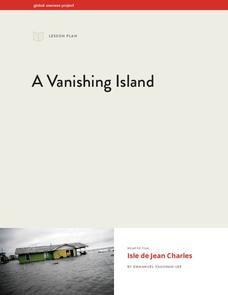NOAA
Deep-Sea Ecosystems – Life is Weird!
A pool of brine in the deep sea can be up to four times as salty as the surrounding sea water. The deep sea ecosystem relies on chemosynthesis and the organisms that live there are often strange to us. The lesson plan focuses on...
Curated OER
Rising Sea Levels: UK and Bangladesh
Students explore the possible effects of global warming. In this geography/global warming lesson, students identify regions using an atlas and complete a global warming worksheet. Students perform an experiment in which they simulate...
Curated OER
Global Warming: Life in a Greenhouse
High schoolers examine the evidence that scientists have used to support the existence of global warming and the greenhouse effect. How the concepts have been developed and evaluated form the focus of this lesson.
Curated OER
Penguins Nesting Know-How
Students maintain a field journal as they follow penguin parents raising their chicks during the breeding season. They formulate testable questions. Students reflect on animal behavior in the field related to survival and chick rearing.
Curated OER
Biomes: The Threat of the Sea
Students create posters to raise awareness about Global Warming as an immediate threat. In this environmental lesson, students respond to the video Biomes: The Threat of the Sea by researching global warming and making posters to raise...
Curated OER
Design a Deep- Sea Vertebrate or Invertebrate
Students design a deep-sea animal. In this research based lesson plan, students research and design a vertebrate or invertebrate that lives in a methane hydrate habitat. They compile a class chart of the adaptations animals have in this...
Space Awareness
The Big Meltdown
Explore the world (our world) of melting ice caps. Why are these caps melting? What is the effect of melting ice caps? Dive into the ever-present issue of global warming with a resource that has learners looking at data and participating...
Curated OER
Snow on Sea Ice
Students examine different samples of ice and predict the amount of snow that has fallen in a given year. Using a calculator, they graph the various thicknesses. They analyze the graphs to determine the relationship between the snow and...
Curated OER
Ice Age Challenge Game
Students use a website to do various projects about the ice age and discover the route taken by the first arrivals are unknown and are the subject of a great deal of debate and research.
Curated OER
Weather, Sea Level Rise and Climate Change Course
Students explain the impact of glacial melting to global climate change. In this environmental science lesson, students design an experiment to investigate the effect of salinity change to melting glaciers. They share their results to...
Curated OER
What's in That Cake?
Cooperative groups research trip logs from deep-sea expeditions and explore characteristics of deepwater habitats. Using a cake as the ocean floor, they work together to decorate it as a model of such habitats. They also prepare a...
Consortium for Ocean Science Exploration and Engagement (COSEE)
Plankton to Penguins: Antarctic Food Web
A well-written lesson plan, second in a series of four, gets high schoolers exploring how the Antarctic food web is impacted by climate change and the associated melting of polar ice sheets. It begins with a PowerPoint presentation about...
Curated OER
Polar Bears in Peril - Climate Change Culprit?
High schoolers explore the changes in sea ice over several years. In this life science lesson, students review and examine 20 years of data. They use Excel to graph data and analyze trends.
NOAA
Animals of the Fire Ice
When the sun's rays can't reach the producers in a food web, where does all the energy come from? Extreme environments call for extreme food sources. Young scientists investigate creatures that appear to get their energy from methane...
Wild BC
Bearly Any Ice
After reviewing food chains, your class members participate in an arctic predator-prey game that exemplifies the impact of climate change of food availability. If you are in a hurry, skip this lesson, but if you have the time to...
Curated OER
Fish and Zooplankton Through Remote Sensing
Ecology aces examine sea surface temperature maps and relate temperatures to concentration in fish and zooplankton populations. Take your class to a computer lab and provide experience with actual remote sensing data. Some of the links...
Curated OER
Bringing Climate Change Into the Classroom
Learners investigate the greenhouse effect and examine the potential effects of climate change in the Arctic. They construct a mini-greenhouse and test its effect on temperature, analyze historical climate statistics, and conduct an...
Polar Trec
Arctic Smorgasbord!
Two blooms of phytoplankton, instead of just one, now occur in the Arctic due to declining sea ice, which will have widespread effects on the marine life and climate. In small groups, participants build an Arctic food web with given...
Curated OER
Biomes: Extreme Climate
Students create a web connecting global warming, the Arctic, and wold climate. They write a paragraph explaining the role of the Arctic in world climate.
Curated OER
Glaciers and Global Sea Rise
Learners explain how melting glaciers affect global warming. For this earth science lesson, students investigate the change in ice density as it melts. They discuss the human and environmental impact of rising sea levels.
Curated OER
Studying Snow and Ice Changes
Students compare the change in snow and ice over a 10 year period. In this environmental science lesson, students use the live data on the NASA site to study and compare the monthly snow and ice amounts on a map of the entire Earth. ...
Polar Trec
Who Will Melt First?
If the Greenland ice sheet melted, sea levels would rise by about 20 ft; if the Antarctic ice sheet melted, sea levels would rise by 200 ft. Scholars explore ice melting through the analysis of different ice samples, clean and dirty ice....
Global Oneness Project
A Vanishing Island
The effects of rising sea levels on Isle de Jean Charles, located off the coast of Louisiana, are documented in Emmanuel Vaughan-Lee's poignant short video. Viewers are asked to consider not only the plight of residents but also what...
Curated OER
The Little Ice Age
In this Little Ice Age worksheet, students read about changes in weather and temperature resulting in changes in rain fall and glacier movement. Students answer three critical thinking questions about the Little Ice Age that occurred as...
Other popular searches
- Iceberg of Sea Ice
- Arctic Sea Ice
- Sea Ice Extent
- Habitat Sea Ice
- Alaskan Sea Ice
- Sea Ice Processes
- Sea Ice Formations










